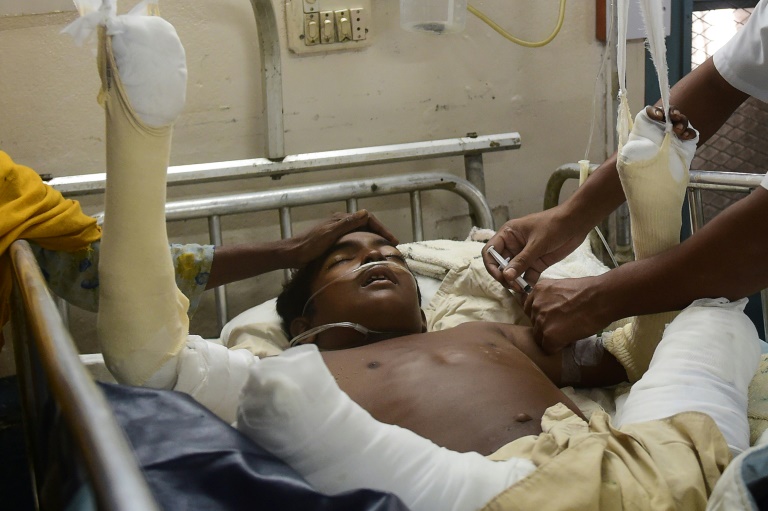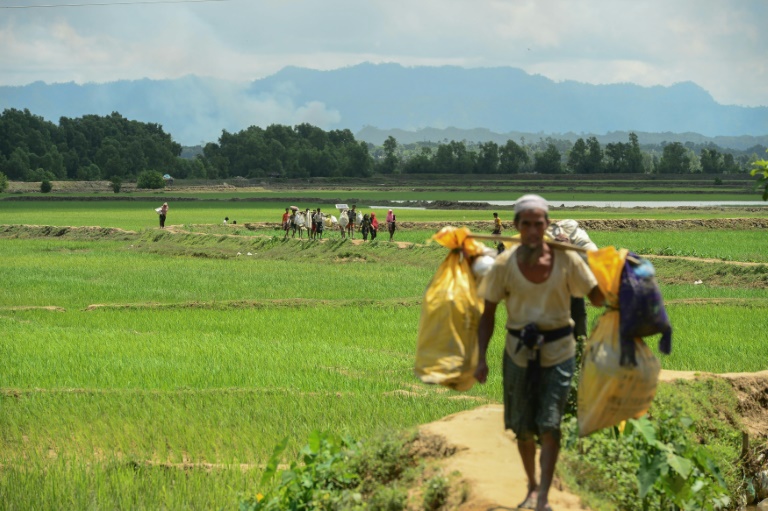Hlophe warns against leadership battles and factionalism at MK party anniversary rally
Instead the 15-year-old is so feeble he can barely beg his mother to bring him a juice, which in any case she cannot afford to buy.
Haque is in a hospital bed in the Bangladesh border town of Cox’s Bazar, bandaged virtually from head to toe. He lost both legs and part of a hand in the explosion, and suffered shrapnel wounds across his body.
“We heard a huge explosion as Azizul stepped on the mine,” said his mother Rashida Begum, standing next to his bed, helplessly shedding tears. “I saw his two legs blown away.”
The family are among 379,000 Rohingya who have sought refuge in Bangladesh from violence in Myanmar’s Rakhine state that started August 25, after Rohingya militants attacked police posts there.
They ran away from their home village of Debinna, and were in sight of the frontier when the boy stepped on a mine near the barbed wire border fence.
“Everyone was in a rush. Nobody could look out for others as the Burmese were chasing us from behind and burning the village,” the mother of four told AFP.
While many Rohingya refugees have recounted tales of torture and rape by Myanmar troops and Buddhist militias as they escaped torched villages, landmines are the latest deadly threat to come to light.

Rohingya Muslim Azizul Hoque, 15, is treated after being injured by a landmine while crossing from Myanmar to Bangladesh, at a hospital in Cox’s Bazar
Senior Bangladeshi officials believe anti-personnel mines, which were banned by a 1997 global treaty, have been planted by Myanmar security forces to prevent Rohingya from trying to return to their villages.
“Since September 3, we have heard at least 12 landmine explosions. At least three people were killed and seven were injured in the blasts,” Border Guard Bangladesh Commander Manzurul Hasan Khan told AFP.
“All indications point to the Myanmar security forces deliberately targeting locations that Rohingya refugees use as crossing points,” said Tirana Hassan of Amnesty international.
“This a cruel and callous way of adding to the misery of people fleeing a systematic campaign of persecution,” she said.
– ‘State of collapse’ –
The UN Security Council on Wednesday broke its weeks-long silence on the crisis in Myanmar and called for an end to the violence, as UN chief Antonio Guterres said the military campaign amounted to ethnic cleansing of Rohingya Muslims.

Rohingya Muslim refugees arrive from Myanmar through Lomba Beel after crossing the Naf river near the Bangladeshi town of Teknaf as smoke billows above what is believed to be a burning village in Myanmar’s Rakhine state
The 1.1-million strong Rohingya have suffered years of discrimination in Myanmar, where they are denied citizenship even though many have long-lasting roots in the country.
Bangladesh does not want the group either, though it is providing the refugees with temporary shelter.
Border guards let Haque’s family enter when they carried the stricken boy to the fence.
“We rushed him to a nearby Doctors Without Borders clinic and they referred us to this hospital,” said his mother Rashida.
Surgeons have conducted multiple operations on Haque, but do not hold out much hope for the youth. A nurse told AFP he feared Hoque could die before the end of the week.
The hospital has struggled to find supplies of his rare blood type for transfusions. “Ninety percent of his body is in a state of collapse,” the nurse said.
Haque is just one of at least 20 Rohingya victims of bullet wounds, burns and bomb explosions being treated at the Cox’s charity hospital.
Several others, including another of her Rashida’s sons, also suffered injuries in the same incident, and are being treated nearby.
Sabekun Nahar, 50, suffered leg injuries after she stepped on a suspected landmine near where Hoque was blown up.
“I wonder how I will ever walk again,” she said, tears welling in her eyes.
Download our app and read this and other great stories on the move. Available for Android and iOS.